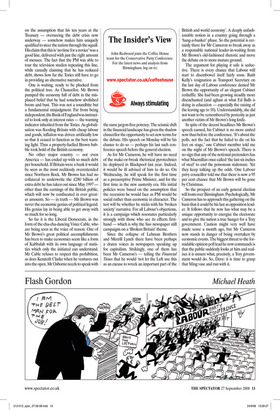The Insider’s View
John Redwood joins the Coffee House team for the Conservative Party Conference. For the latest news and analysis from Birmingham, log on to:
www.spectator.co.uk/coffeehouse
Always stimulating
the same jargon-free potency. The seismic shift in the financial landscape has given the shadow chancellor the opportunity to set new terms for the debate. His speech on Monday will be his chance to do so — perhaps his last such conference speech before the general election.
As for Mr Cameron, he will have no need of the make-or-break rhetorical pyrotechnics he deployed in Blackpool last year. Indeed, it would be ill advised of him to do so. On Wednesday, he will speak for the first time as a presumptive Prime Minister, and for the first time in the new austerity era. His initial policies were based on the assumption that the recession he would face as PM would be social rather than economic in character. The test will be whether he sticks with his ‘broken society’ narrative. For all Labour’s objections, it is a campaign which resonates particularly strongly with those who see its effects firsthand — which is why the Sun newspaper still campaigns on a ‘Broken Britain’ theme.
Since the collapse of Lehman Brothers and Merrill Lynch there have been perhaps a dozen voices in newspapers speaking up for capitalism. Strikingly, one of them has been Mr Cameron’s — telling the Financial Times that he would ‘not let the Left use this as an excuse to wreck an important part of the British and world economy’. A deeply unfashionable notion in a country going through a ‘hang-a-banker’ phase. So the potential is certainly there for Mr Cameron to break away as a responsible national leader-in-waiting from Mr Brown’s old-fashioned rhetoric and move the debate on to more mature ground.
The argument for playing it safe is seductive. There is every chance that Labour will start to disembowel itself fairly soon. Ruth Kelly’s resignation as Transport Secretary on the last day of Labour conference denied Mr Brown the opportunity of an elegant Cabinet reshuffle. She had been growing steadily more disenchanted (and aghast at what Ed Balls is doing in education — especially the raising of the leaving age to 18). Understandably, she did not want to be remembered by posterity as just another victim of Mr Brown’s long knife.
In spite of the decent headlines Mr Brown’s speech earned, his Cabinet is no more united now than before the conference. ‘It’s about the polls, not the fact that he failed to die on his feet on stage,’ one Cabinet member told me on the night of Mr Brown’s speech. There is no sign that any of the notional pretenders has what Macmillan once called ‘the last six inches of steel’ to end the poisonous stalemate. Yet they keep talking up the odds. One Labour privy councillor told me that there is now a 95 per cent chance that Mr Brown will be gone by Christmas.
So the prospect of an early general election will loom over Birmingham. Psychologically, Mr Cameron has to approach this gathering on the basis that it could be his last as opposition leader. It follows that he now has what may be a unique opportunity to energise the electorate and to give the nation a true hunger for a Tory government. Caution might very well have made sense a month ago, but Mr Cameron now stands in danger of being overtaken by economic events. The biggest threat to the formidable opinion poll lead he now commands is that the public suddenly looks at him and realises it is unsure what, precisely, a Tory government would do. So, Dave: it is time to grasp that Ming vase and run with it.










































































 Previous page
Previous page